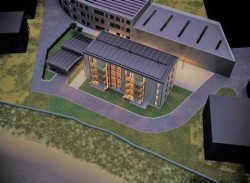WELink also targeting US market and global solar energy expansion.
Irish-founded and Dublin-headquartered modular home builder and solar energy developer WElink Group has signed a €2.9bn joint venture to build over 25,000 energy-efficient modular homes, five new factories and an R&D centre in Britain over the next five years.
Founders Barry O'Neill, a former executive with Irish-headquartered oil-to-computer-games distributor DCC and engineer Breandan MacAmhlaoibh, both Dubliners, also said they plan to enter the huge US market this year, where just over a million new homes a year are built.
The privately-owned firm is also developing €500m of new solar energy installations, with a capacity of about 440MW. It plans a further €800m more, with a capacity of 720MW. The projects will be located in the UK, Spain, Portugal, the US, Latin America and South East Asia.
Last January, this newspaper revealed how the duo had quietly raised over €300m in the past seven years, with the new projects' capital costs financed using project finance that the firm has raised. The business is profitable and O'Neill and MacAmhlaoibh retain the controlling equity stake in each of its projects. Other investors are a mix, mainly of family offices, small funds and private investors here, in the US and in Britain.
The firm's key partner in the construction projects is China National Buildings Material, a state-owned firm with $85bn (€80bn) of net assets involved in cement, lightweight building materials, glass, and plastic products, manufacturing and engineering services around the world.
The UK expansion also involves a partnership with Your Housing Group (YHG), a provider of social, affordable and retirement housing, which has 33,000 properties across the north of England and its midlands, and was involved in regenerating the Anfield area of Liverpool.
Each factory the firm establishes there will involve about €24m of investment, O'Neill said. There will also be at least 100 direct new employees, with up to 300 indirect jobs involved per factory.
"There's a commitment to a national strategy in Britain, involving standardised design and fast modular construction. It's a definite opportunity to keep these factories busy in each region," he added.
The announcement is likely to be one of the biggest investments by an Irish company in Britain this year, representing a huge vote of confidence given the uncertainty around Brexit.
It also comes at a time when the UK needs vast numbers of affordable new homes for its growing population.
It grew by over 500,000 in the year to June 2016, with net immigration of 335,000 for the same period.
From 45 employees 18 months ago in nine locations around the world, including Dublin, WElink's workforce has doubled to 92, with a further 35 joining by March.
Its staff is likely to increase to 200 by the end of the year, not including the factory workers.
Its modular buildings involve no water, concrete or waste in the building process, and can be built in about two weeks. They feature green technologies such as rainwater harvesting, rooftop solar panels and energy storage, and typically generate at least as much energy as they use. Equipment suppliers include Tesla, GE and Siemens.
O'Neill explained that the firm's agreed strategy with partner CNBM is to initially focus on the large markets of Britain, Spain and the US, meaning it could be some time before it turns its attention to the Irish market, where it would need a development partner. "Markets that don't have their scale are a different proposition," he said. "Our factories can produce 4,000 homes a year. We have the technology and the construction expertise, plus we provide finance and source materials.
"Our position in energy-efficient modular housing and renewable energy will generate more opportunities to grow. Our focus this year is to grow our footprint in the UK and Spain, while establishing a platform to enter the US market in the coming months, also with a joint venture partner. After that, we'll look to extend our reach to other markets, including Ireland," he said.
Original link - Independent









